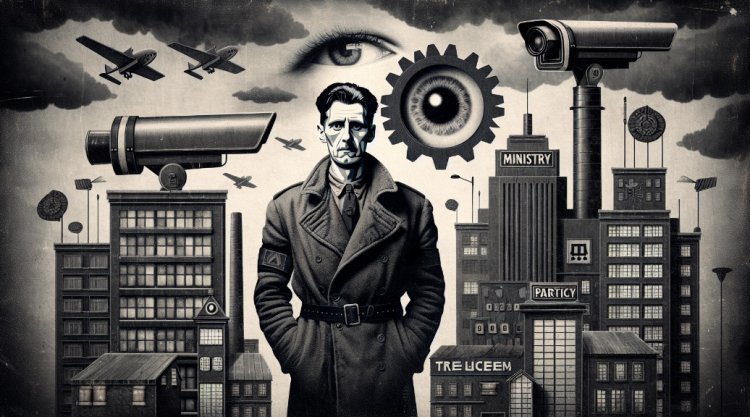The Chilling Vision of 1984: How Big Brother Controls Society
"Delve into the chilling vision of '1984,' George Orwell's dystopian masterpiece. This article examines the novel's portrayal of Big Brother's control over society, exploring themes of surveillance, propaganda, and the loss of individual freedom, and its relevance to modern times."

Introduction
In 1984, George Orwell paints a terrifying picture of a society where Big Brother, a totalitarian government, constantly monitors and controls people. Published in 1949, Orwell's dystopian novel has become increasingly relevant in modern society. The predictions made by Orwell in 1984 have come true in many ways, highlighting the power of the novel's insights.
-
Overview of George Orwell's 1984
In 1984, Orwell presents a society where the party is in charge and controls every aspect of life. The party's ideology, known as Ingsoc, seeks to control information tightly, erasing and rewriting reality to suit its needs. The story follows the protagonist, Winston Smith, as he rebels against the party's control and questions the reality presented to him.
-
The relevance of Orwell's predictions in modern society
Orwell's predictions in 1984 have proven to be eerily accurate in the modern world. From constant surveillance to information control, elements of the novel can be observed in our society today. The rise of technology and the ease of monitoring individuals have fueled concerns about privacy and the erosion of personal freedoms. Additionally, the manipulation and rewriting of history to suit certain narratives can be seen in various forms of media and politics.
The Party's Control
The ideology of Ingsoc, the ruling party in George Orwell's 1984, is centered around tight control over information. Ingsoc seeks to dictate and manipulate every aspect of life, erasing and rewriting reality to suit its needs. This control over information is a key component of the party's power. By controlling what people see, hear, and believe, the party is able to shape their thoughts and actions.
Doublethink, a concept introduced in the novel, is the practice of holding two contradictory beliefs or accepting contradictory information without questioning. This is a crucial tool that the party uses to keep the populace under its control. By promoting doublethink, the party can rewrite reality and convince individuals to accept the party's version of the truth, even if it contradicts their own experiences or beliefs.
Through the manipulation of information and the use of doublethink, the party can maintain absolute obedience and control over the population. The constant surveillance, the rewriting of history, and the eradication of individuality all serve to further solidify the party's power and suppress any form of dissent.
-
Ingsoc seeks to control information tightly, erasing and rewriting reality to suit its needs.
-
Doublethink is the practice of holding two contradictory beliefs without questioning, allowing the party to rewrite reality and maintain control.
Historical Context
The concept of noble lies throughout history:
-
Thousands of years ago, Plato wrote about the concept of noble lies. In his philosophy, society's origin was based on a fictional story that justified the social order. This allowed people to accept their place in society and maintain social order.
-
In modern society, noble lies are still prevalent. Institutions and governments often promote narratives that may not align with reality to maintain control and justify their actions.
The rise of habitus and societal illusions:
-
Habitus is the shared societal illusion of how the world should be. It influences a person's environment, interactions, and personality, and it determines societal trends and laws.
-
Throughout history, societal habits have evolved and changed to reflect the values and beliefs of the elite. However, when the habit becomes poisoned or manipulated, it can lead to the erosion of personal freedoms and control by those in power.
-
In the world of 1984, the party controls the habitus and manipulates the populace's thoughts and behaviors.
Parallels in Today's Society
In his book 1984, George Orwell presents a terrifying vision of a society under the control of a totalitarian government. While the novel was published in 1949, many of Orwell's predictions have become eerily accurate in today's world. There are several parallels between the dystopian world of 1984 and our modern society, highlighting the power of Orwell's insights.
Examples of misinformation and censorship
In 1984, the party in power tightly controlled information, erasing and rewriting reality to suit its needs. In our society today, we also see examples of misinformation and censorship. The manipulation of information and the spread of false narratives have become common as people in positions of power seek to control public opinion. Social media platforms are increasingly censoring certain viewpoints, limiting freedom of expression, and stifling open dialogue.
The Erosion of Freedom and the Rise of Control
In 1984, the party's ideology sought absolute control over every aspect of life. Similarly, in today's society, we are witnessing an erosion of freedoms and a rise in control. The constant surveillance, both by governments and private entities, raises concerns about privacy and individual autonomy. The concentration of power in the hands of a few major corporations and the manipulation of information further solidified control over the population.
Additionally, the rewriting of history and the manipulation of narratives can be observed in various forms of media and politics today. Certain events or facts are distorted or omitted to suit certain agendas, leading to a distorted perception of reality.
It is essential to remain vigilant and critical of the information we consume, to question narratives, and to protect our freedoms. By recognizing these parallels, we can strive to preserve our autonomy and ensure a society that values truth, transparency, and individual rights.
The Importance of Consciousness and Individual Growth
The Book of Job is a thought-provoking text that offers valuable lessons on consciousness and individual growth. In this ancient story, Job, a righteous and prosperous man, faces immense suffering and loss. He questions why he is being subjected to such hardships, challenging the idea of a just and benevolent God. Job's friends offer traditional explanations, suggesting that his suffering is a punishment for his sins. However, Job refuses to accept their simple explanations and demands an audience with God.
In God's response to Job, we find profound wisdom. God speaks from a whirlwind, challenging Job to consider the vastness and complexity of the natural world, highlighting the limitations of human understanding. Through this dialogue, Job gains a deeper understanding of his place in the universe and the role of suffering in his personal growth. He realizes that his suffering is not a punishment but a test of his faith and resilience.
Job's journey teaches us the importance of consciousness and self-reflection in the face of adversity. It encourages us to question our own beliefs and values and to embrace the challenges that life presents. Rather than avoiding pain and discomfort, Job's story reminds us that true growth comes from confronting and overcoming these obstacles.
Similarly, the power of prayer and self-improvement plays a significant role in individual growth. Prayer, in its true essence, is not simply asking for something and expecting a reward. It is a practice of introspection and self-reflection. It allows us to align our thoughts and actions with our values and to seek guidance and strength from a higher power.
By engaging in prayer and self-improvement, we cultivate a deeper understanding of ourselves and our purpose. We become more conscious of our actions, beliefs, and the impact we have on others. Prayer helps us navigate the challenges of life and find inner peace and fulfillment.
In a world that often seeks to control and manipulate individuals, consciousness and individual growth become essential tools for personal freedom and autonomy. By actively seeking self-improvement and questioning the narratives imposed upon us, we can break free from the constraints of societal expectations and live a more authentic and fulfilling life.
Rejecting Big Brother and Embracing Individualism
In a world where individuals are constantly watched and controlled, it is crucial to reject societal narratives and embrace consciousness. In 1984, George Orwell paints a terrifying picture of a society where Big Brother rules and controls every aspect of life. The party's ideology, known as Ingsoc, seeks to control information tightly, erasing and rewriting reality to suit its needs. This control over information is a key component of the party's power, as it shapes the thoughts and actions of the population.
However, rejecting Big Brother and embracing individualism is essential for personal freedom and autonomy. It is the need to take back control of your mind and determine your own path. Here's why:
-
The need to reject societal narratives: Society often imposes narratives and beliefs that may not align with our own values and principles. By rejecting these narratives, we can break free from the constraints of societal expectations and live a more authentic life.
-
Embracing consciousness: Being conscious of the world around us allows us to see past the illusions and manipulations of those in power. It enables us to question the information presented to us and seek the truth for ourselves.
-
Taking back control of your mind: Big Brother thrives on controlling minds, but by taking back control of our own minds, we can resist their influence. This involves being critical of the information we consume, questioning narratives, and seeking alternative perspectives.
-
Choosing your own path: By embracing individualism, we can define our own goals, values, and life's purpose rather than slavishly adhering to society's predetermined path. It is about pursuing our passions and desires, regardless of societal expectations.
Rejecting Big Brother and embracing individualism requires courage and a strong sense of self. It means being willing to challenge the status quo and question the narratives imposed on us. By doing so, we can break free from the chains of control and live a life true to ourselves.
Conclusion
The rise of individualism and the hope for a new world order
In George Orwell's 1984, the rise of individualism and the hope for a new world order are explored. The totalitarian government known as Big Brother controls every aspect of life, erasing and rewriting reality to suit its needs. However, despite the party's control, there is a glimmer of hope for individualism. Characters like Winston and Julia rebel against the party's control and seek a different future. This rebellion represents the human desire for freedom and the longing for a society that values individual rights and autonomy.
The importance of consciousness and growth in shaping the future
Throughout 1984, consciousness and growth played a crucial role in shaping the future. Winston's journey is one of self-reflection and questioning the narratives imposed upon him. He realizes the importance of consciousness and the need to break free from the constraints of societal expectations. By engaging in self-improvement and seeking the truth, individuals can pave the way for a brighter future. Personal growth and the pursuit of knowledge are essential tools for resisting control and shaping a society that values truth, transparency, and individual rights.
George Orwell's 1984 serves as a chilling reminder of the dangers of totalitarianism and the power of individualism. The rise of individualism and the hope for a new world order represent the human desire for freedom and autonomy. Consciousness and growth are essential in shaping the future and breaking free from the constraints imposed by those in power. By embracing these principles, individuals can strive for a society that values truth, transparency, and individual rights.



 admin
admin 










